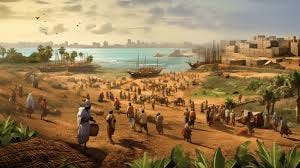Somalia is a country with a rich culture and history. We mostly hear about what Somalia was like during Colonial times in which the Italians occupied the country until gaining independence in 1960, as well as what Somalia was like before the civil war. However, we don’t really hear much about what it was like in eras such as the Middle Ages, so that is what I will be discussing today.
During the Middle Ages, Somalia was a monarchy. From the 10th to the 16th century, the Mogadishu Sultanate ruled parts of present-day southern Somalia. Throughout their rule, many explorers such as Ibn Battuta and Ibn Khaldun have described the kingdom as a metropolis and that the city had a lot of wealthy merchants. They also mentioned that the kingdom was ruled by a Sultan who had a group of ministers, eunuchs, commanders, and other officials at his beck and call. Somalia in the Middle Ages was at its peak with merchants from places such as India, China, and the Middle East trading with the Somalis and vice versa.
According to the accounts of Marco Polo, Kublai Khan’s envoys visited Mogadishu but were imprisoned on the suspicion of spying. Marco Polo described Mogadishu as an ‘island’, the most noble and beautiful ‘island’ in the whole world. The name Madagascar actually comes from Mogadishu but it was mispronounced (throwing in a little fun fact here). Vasco Da Gama described Mogadishu as a large city with houses as high as up to 5 to 6 stories, with big palaces in it’s centre. Based on the descriptions of Mogadishu, we can sure say that the many explorers who have visited the city were very much fascinated. Some have also praised the Somalis for their kind hospitality.
There was not much I could find regarding how the locals of Mediveal Mogadishu lived, but there was a lot of wealthy merchants and the city was thriving. The people consisted of merchants, scholars, etc.
I absolutely love reading about the Middle Ages, but I wished there was more information on the Sultanate of Mogadishu. InshaAllah with more research, I will make another post to touch more on it.
Until next time,
Layla






